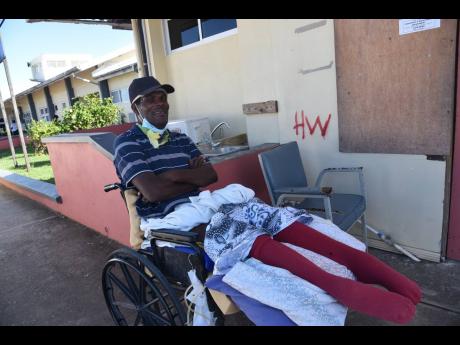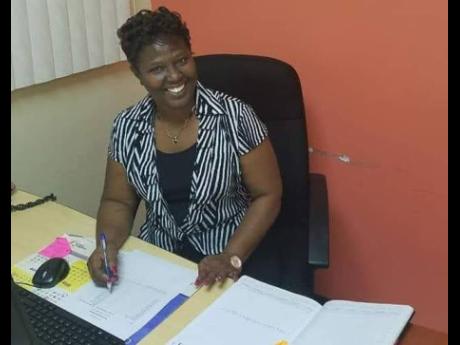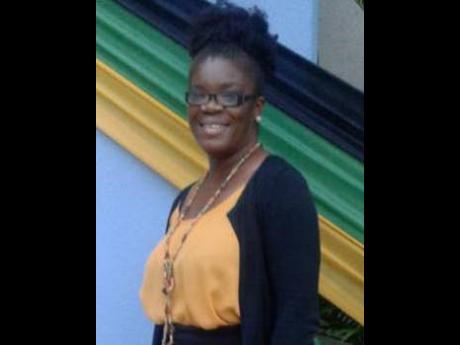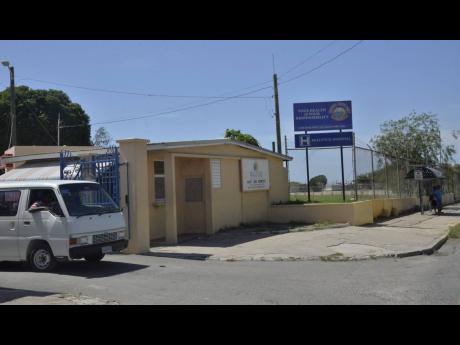‘Not my responsibility’
Clock winds down as Gov’t, families set to square off over social patients
A threat by the Government to take legal action against families who have abandoned relatives at the island’s public hospitals has not scared Candace*, who is convinced that her father, Carlton*, is right where he should be: out of her life. Health...
A threat by the Government to take legal action against families who have abandoned relatives at the island’s public hospitals has not scared Candace*, who is convinced that her father, Carlton*, is right where he should be: out of her life.
Health and Wellness Minister Dr Christopher Tufton had signalled the State’s intention to pursue civil action against these families as the sector was crumbling under the weight of the third wave of the COVID-19 pandemic.
More than 500 persons who have been discharged still remain in the island’s major public-health facilities – the longest current case being 14 years – occupying bed space and putting a strain on resources as their relatives have not turned up to take them home.
Referred to as social patients, it costs the Government roughly $408.6 million annually to care for them, at an average of $2.04 million per person. This expenditure includes remuneration for nurses, doctors, social workers, and nursing assistants, who tend to them occasionally, as well as medication, accommodation, meals, toiletries, and other personal care items.
The figure could be significantly higher if costs accumulated by Bellevue, a mental health institution in Kingston with more than 350 social patients, are added using the same base cost, although yesterday the health ministry could not readily say whether the average cost would be similar to that at other facilities. Tufton, however, noted that it was “expensive”.
But despite pleas by health officials, including hospital administrators, for Jamaicans to collect their relatives, Carlton is no closer to knowing his fate even as another Christmas nears.
Candice, an educator in the early childhood sector, told The Sunday Gleaner that her dad had walked out of their lives when they were at a tender age, causing the family great pain, adding that the act was unforgivable.
“My only recollection of my father being around was when I was about six years old, [when] my sister was a baby. He walked out on us. All I had was my mother, who did what she had to do to put food on our table, and there is no court that can tell me that he is my responsibility,” Candice said adamantly.
“Such a decision would also disrupt my family life because I have never mentioned him, not once to my children or my husband,” she continued. “He is fine where he is.”
With Bellevue topping the list for social cases with 350 of the just over 500 patients, the problem-plagued Cornwall Regional Hospital in St James – where Carlton remains – comes in next with some 55 social cases, followed by the Black River (18), Kingston Public (16), and Savanna-la-Mar (15) hospitals, according to data obtained by The Sunday Gleaner since November 30.
Administrators islandwide are expecting the numbers to climb even higher during the festive season as traditionally, more relatives seek to rid themselves of the responsibility of caring for their elderly family members in order to party or travel.
Hospital-hopping has become a popular practice, officials say, where relatives will leave the family member at medical facility ‘A’ one Christmas but will take them to another location the following year.
Tufton told The Sunday Gleaner that the legal team is well advanced in its investigations into specific cases to be placed before the courts to determine if persons can be held accountable for their abandoned relatives, under Section 10 of the Maintenance Act.
“The team is now gathering data on specific cases, and we intend to pursue [them] in the new year and see what the courts rule on the matter. This will also determine if, legislatively, there needs to be changes in law,” he said.
A case-by-case investigation is being used to differentiate the infirm from those who have been abandoned in the care of the State, Tufton said, and to determine options in terms of classification.
Some of the factors for abandonment, apart from neglectful fathers, include the inability of relatives to care for special conditions, such as individuals that are bedridden and require 24-hour care; persons who are oxygen-dependent; stigma associated with HIV/AIDS; mental health concerns; and financial challenges, a ministry audit has revealed.
The Jamaica Constabulary Force is also fingered in the audit, which noted that cops use the hospitals as places of safety for persons in need of care and protection without providing information or assistance with investigations.
Camille Lewin, CEO of the Savanna-la-Mar Hospital, says that among her 15 social cases at the Type C facility are patients that were discharged from as far back as September 2005, but while she is desperate to free up bed space to accommodate the 45 waiting patients in her accident and emergency area, she cannot turn her back on patients facing abuse from loved ones.
“We have sent home patients, but they return soon after because they are being abused by their relatives. So we try to determine the condition that they will be living in because if they are going home to ill treatment, it is best to have them here, so that places me between a rock and a hard place,” she told The Sunday Gleaner.
“One of my wards can accommodate 36 patients, and if I have 45 patients waiting on beds, I need those spaces,” Lewin added. “But this number is going to go up because the trend is that during the Christmas season, relatives just drop off their senior family members with their luggage and drive away.”
More than 10 per cent of bed capacity
Her colleague at the 50-bed Noel Holmes Hospital in Lucea, Hanover, Carrington McLennon, is desperate to have access to the eight beds now occupied by social patients and is hoping for a solution sooner rather than later.
“All eight patients have been here in excess of five years, and when you take into consideration that our bed complement is 50, if you do the math, you will see that social cases take up more than 10 per cent of our bed capacity, and that needs to be addressed,” said McLennon.
In 2019, the Government implemented the Enhancing Healthcare Services Delivery Project with the objective of improving access to services in the healthcare system, a strategy to reduce wait time and overcrowding in hospitals. The removal of social cases from hospitals is among the areas targeted to improve service delivery, using several strategies, including the filing of civil suits; partnering with the Ministry of Local Government and Community Development to expand facilities at the Kingston and May Pen infirmaries at a cost of $50 million; arranging for accommodation at nursing homes, such accommodation to be funded by the pension of the affected social patient; and targeting families that are using the resources of the abandoned relative with a view to channelling those funds into their care and protection.
“The concept of public-private partnership is alive and well in the health sector,” Tufton said. “We see it in diagnostics, with vaccines, and you will see more of such arrangements over time because it is more efficient and cost-effective. So that is something we will be exploring further in the coming months.”
Forty-nine-year-old Dennis Green has been at the Falmouth Hospital in Trelawny since he was admitted in 2009 after falling from a tree in his community of Bounty Hall in the parish, ending up crippled from the waist down.
Hospital CEO Princess Wedderburn said that efforts to get Green and others off the books have not borne fruit.
“We have been reaching out to family members, but they are not taking them,” she said. “They are not responding and even want to deny that they are related and use trickery to visit, especially now that the wearing of masks is mandatory.”
Green’s stay at the 141-bed hospital comes at a cost of $3,000 daily or more than $13 million since his admission 12 years ago, despite being in good health.
“I have some bedsores that the doctors are treating for me, but apart from that, mi all right,” Green, popularly called Hammer Mouth, told The Sunday Gleaner.
He spends his time keeping tabs on those who have passed away during his stay.
“Mi give thanks because I count 236 [fatalities] and me still alive, so I give thanks because God have me here for a purpose,” he said.
When The Sunday Gleaner visited Bounty Hall, residents confirmed that Green’s parents died several years ago. It was also discovered that his two brothers were unsettled and would not be in a position to help him.
Green said that he did everything for himself and was confident that he could still hold his own on a construction site if given the opportunity. He is hoping for support from charity organisation Food For The Poor to get a room as he does not want to live at an infirmary.
But for Tufton, such patients will have no choice as to where they will be accommodated if they remain on the Government’s books.
“The truth of the matter is that if you are living at the expense of the State, I don’t think there are a lot of options that they can exercise if there is an alternative arrangement that suits the greater good of society,” he said.
*Names changed to protect identities.
Annual cost to health sector for care of social cases
Category Total annual cost
Nursing services $213,696.00
Medical doctors $112,639.20
Social worker $277,902.72
Nursing assistant $465,024.00
Medication $40,000.00
Accommodation $365,000.00
Meals $481,800.00
Toiletries & personal
care items $87,120.00
Totals per case $2,043,181.92
Total for 200 cases $408,636,384.00
Source: Ministry of Health
Number of social cases currently in hospitals
Hospital No of cases as at Nov 30, 2021
St Ann’s Bay 7
Port Antonio 8
Port Maria 3
Annotto Bay 3
Kingston Public 16
Bellevue 350+
Spanish Town 12
Sir John Golding 1
Bustamante 0
Princess Margaret 7
Linstead 2
Mandeville 4
May Pen 9
Lionel Town 3
Percy Junor 11
Black River 18
*Cornwall Regional 55
*Falmouth 9
*Noel Holmes 8
*Savanna-la-Mar 15
Total 541+
*Updated since Nov 30
**Although not giving a precise number, the health ministry told The Sunday Gleaner yesterday that there were more than 350 social cases at the Bellevue Hospital.




